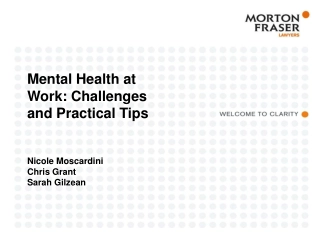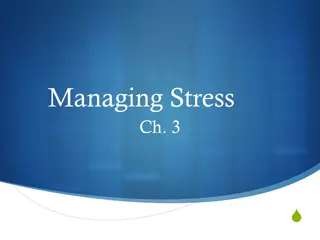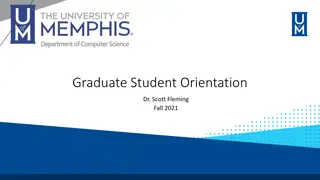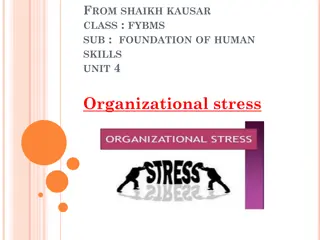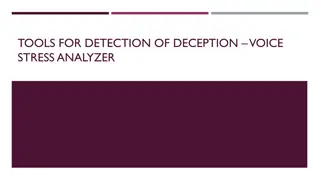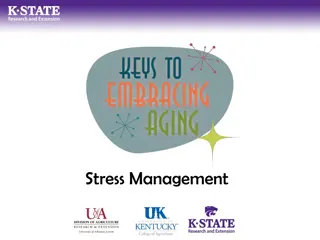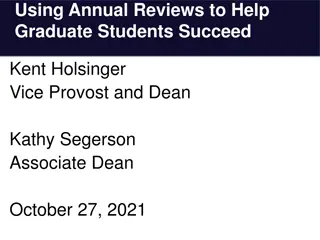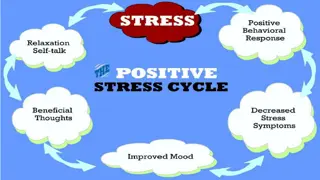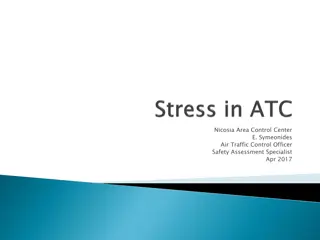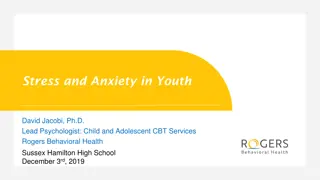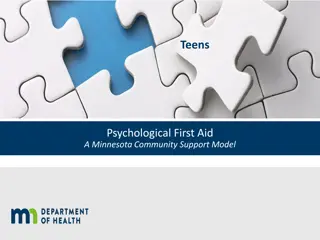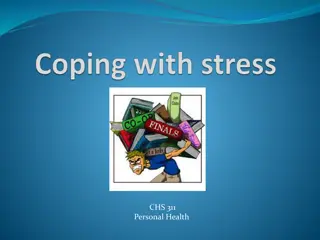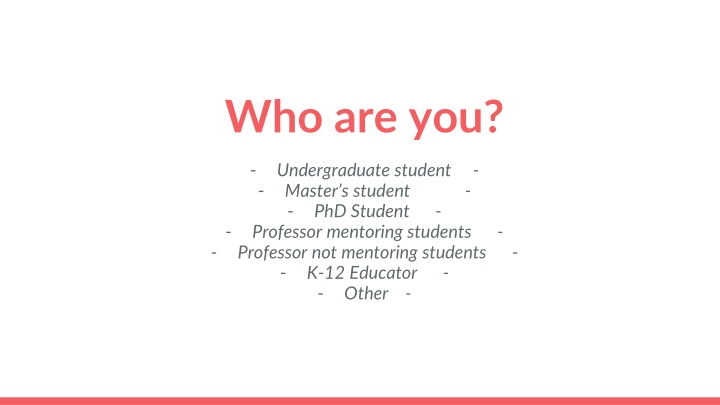
Managing Graduate Student Stress and Challenges
Explore the various stressors and challenges faced by graduate students, along with helpful solutions and strategies. Topics include time management tips, addressing mental health issues, building community support, and navigating academic pressures. Gain insights on managing graduate student stress effectively.
Download Presentation

Please find below an Image/Link to download the presentation.
The content on the website is provided AS IS for your information and personal use only. It may not be sold, licensed, or shared on other websites without obtaining consent from the author. If you encounter any issues during the download, it is possible that the publisher has removed the file from their server.
You are allowed to download the files provided on this website for personal or commercial use, subject to the condition that they are used lawfully. All files are the property of their respective owners.
The content on the website is provided AS IS for your information and personal use only. It may not be sold, licensed, or shared on other websites without obtaining consent from the author.
E N D
Presentation Transcript
Who are you? Undergraduate student - Master s student - PhD Student - Professor mentoring students - Professor not mentoring students - - K-12 Educator - - Other - - - - - -
Managing Graduate Student Stress Annie Klyce & Wayana Dolan
What are you struggling with? What do you want advice on? - What questions do you have for your peers? - - -
What are you doing well? - Consider what advice you would give to others around you - What s working well for you? - -
(Some of the) Issues Graduate Students Face Common Problems Helpful Solutions Planning ahead, listing, prioritizing, Setting up boundaries and respecting them. Finding community outside of academics Whistle blowing, documentation, networking/mentoring, changing advisors, Setting up boundaries and priorities and respecting them, as well as scheduling in basic needs, and setting a routine See discussion on slides 13-19. NCFDD mentor map, email tips, writing down names at workshops and conferences, reaching out Look for groups of people with similar interests. Budgeting, unionizing T H E R A P Y, tell your friends, schedule down time, healthy coping mechanisms, healthy eating Time management - research, teaching, home, family, etc. Work life balance Adversarial relationships with advisors & committees Fulfilling basic human needs - sleep, eating, exercise, outdoors Experiences of isolation, otherness, and racism, particularly for students from marginalized backgrounds Networking & mentorship Making friends Financial stress Anxiety and Depression 1. 2. 1. 2. 3. 3. 4. 4. 5. 5. 6. 6. 7. 8. 9. 7. 8. 9.
Other topics Therapy Support Groups - LBTQ+, BLM, and other groups on campus to find social support Alcoholism and drug use Talk about your salary with other graduate students, and learn how to listen to your peers when they talk about it Coping after covid
Time Management Tips based on NCFDD Workshop 1. Get a planner (digital or print) Use it! 2. Set up a 30min block of time at the beginning of the week to write down your goals and to do lists 3. Write down your non-negotiable commitments (e.g., commute, class, teaching, gym) - 5 minutes 4. Write down everything you need to do in the upcoming week, group by your hat (e.g., student hat: homework, study; human hat: visit animal shelter, coffee with a friend) - 10 minutes 5. Emphasize the things that absolutely have to happen. Do this by highlighting, adding a star, etc. 6. Write down when you re going to work on each task - 15 minutes If you don t plan a break, your body will force you into one. It's not on you to make other people's little fires fit! Let people know that you're working on a deadline. Winning this game is not making it all fit, it's acknowledging that it's not all going to fit and prioritizing based on that.
Time Management - When you cant pull it off Renegotiate a deadline Delegate Ask for help from an advisor to prioritize Decide to let things go that don't matter Do things at a lower standard than the perfection standard you normally hold yourself to Make these decisions in advance - this way you're not making the decision once they're "late" When you're thinking about these things in advance, you can make decisions about what you don't have time for.
Time Management - When you cant pull it off Added notes from EER 2021 Think about what is next: time management goes with you to whatever job that you have. It is important to practice now! If you are mentoring students, you can also help them learn to set boundaries
Work Life Balance Consider the things you allow yourself feel fulfilled by Often we only allow school and work to be our sources of dopamine, but consider the consequences of that What things can you start feeling proud of? You have plenty to be proud of. How can you reward yourself for a job well done? How do you define a job well done? Start acting like caring for yourself is as important as submitting something to your advisor, or turning in your homework on time
Work Life Balance Ideas from EER 2021 Pack your backpack, even if working from home Leave the physical work space for breaks Prioritizing family--talking with your advisor if you are worried about taking time for your family If you are applying to graduate school, ask a potential advisor s students how they feel about work- life balance. When TAing: in terms of not feeling pressure to reply to student emails at weird hours: set strong boundaries up front about when you are available to answer emails
Adversarial relationships with advisors & committees It is OK to change advisors Use the non-problematic people in those groups to advocate for you (i.e. if your advisor is problematic, the committee can be your advocate, and visa versa) or find new connections if you decide to switch advisors University Ombuds offices can help talk you through your options It is ok to take a vacation and make it a REAL vacation Who (both peer and faculty) can support and advocate for you in the case of an adversarial relationship? How is this relationship impacting your health and your career prospects? Is it time to change?
Fulfilling basic human needs You are basically a houseplant with more complex emotions Be sure to prioritize and respect your needs for Eating - Just a reminder that your brain is ~2% of your body weight but uses 20% of your body s energy! Sleeping (7 hours a night minimum) Exercise - this could be walks outside, going to the gym or however you choose to move your body! Socializing - Humans are a social species, ask anyone who lived alone in the last year why it s important to be with other people Go to the bathroom - You should be able to step away from a meeting, your code, or a class and go to the bathroom. Graduate school will still be there when you get back Take vacation days - Literally do it If you re someone who would put off doing these things, put them on your calendar!
The following slides contain a response from a Latin American graduate student in the geosciences. This may be triggering for some students, but we believe that it s important for people to understand you re not alone in these experiences. American students should know that this is not an isolated experience, consider how you contribute to this and how you can make your peers more welcome
Students from Marginalized Groups AS A MEMBER OF THE COMMUNITY AS AN ALLY You don t have to do anything if you don t want to. Most times white and american people believe that this is not their problem to fix. If you are part of a marginalized group it s not your responsibility to advocate for change and educate people. Repeat this. Write it down. Develop a lab guiding document on anti-racism in the lab, in the field, and working with the community. Encourage this to be done at a departmental level as well Include anti-racism research in paper discussion seminars Work with members of communities on campus and in your department to help make a resource list for incoming students If you do want to do something: Advocate for yourself. However that looks like. Either calling out people when they say xenophobic-racist comments or talking to a therapist, a friend. If you feel motivated and energized, find/build a small community where you feel safe to talk about this. Don t come with expectations: When you meet someone, don t expect them to like/look/talk/do certain things just because some characteristic or appearance. Although building a community of people who identify with this issues is great, this doesn t mean that white/american fellows can t be part of the process. Creating small groups of people just reinforces the idea of segregated groups. The more we are separated the harder will be to break all the systemic problems. Educate yourself: There are plenty of podcasts/books/articles where you can learn about the problems. You can also talk to your friends who are part of the community (if they feel comfortable doing so). But don t expect the problems to be fixed w/o your work and input. A systemic problem can only be solved if EVERYBODY works towards the solution. Look for an URGE (Unlearning Racism in GEosciences ) pod! Take the back seat: Don t try to be a leader or the hero that will have all the solutions.
Students from Marginalized Groups AS A MEMBER OF THE COMMUNITY AS AN ALLY New culture, new everything: as simple and silly as it sounds we need to build a whole new life from scratch. Everybody has their preferred store, doctor, local produce market International students need to rebuild all of those connections that took us many years to build in our home country (also applied for American students who move from other states, but it s less shocking since it s the same or pretty similar culture) Buddy up with an international student to show them your favorite grocery stores and shopping centers. Because the area may be new to both of you, adventure and try new places together (like local restaurants, the farmer s market, etc.) It is common for some Latin American students to be used to buy mostly local produce and goods. It s a bit of a shock when coming to the US everything is industrialized and veggies look plastic. Ask your friend what life at home was like, and if they re interested in finding similar things near your University. This could be an opportunity to learn about the culture shock they re experiencing, or a chance for you to try something new together! Feeling detached from your roots: Often times, international students in the US start to experience some identity issues (Especially if you were not able to go home because of COVID). Although this is normal, it s a complex and difficult thing to struggle with. You might feel a little but less identified with your home country but still not entirely comfortable in the American culture. Work this with yourself. Talk to a therapist, get to know yourself, practice self-care and self-love... find something from you that doesn t change no matter where you are. Be a human, be a friend.
Students from Marginalized Groups AS AN ALLY AS A MEMBER OF THE COMMUNITY It may seem intimidating to add another thing to your never ending to do list, but spend time educating yourself on current immigration and political policies. Take time to learn how your preconceived notions of international students and employees have shaped how you treat the people around you. Have these difficult discussions with peers so you can mutually grow and learn. The stereotypes: If you don t have an american passport you may be told by someone that you are illegal . Often times people who say these things don t really understand immigration policies, but this is the result of years of oppression and stereotypes leading the dominant speech of If you are not american, you are illegal and you are stealing our jobs . It hurts. If a stereotype often comes to mind while you re working with someone, take a mental note of a trait specific to that person every time you think of the stereotype. For example, if a stereotype comes to mind while you re in a meeting with someone, follow up the thought with I appreciate how [person] has memorized so many equations or I m grateful when [person] provides such critical feedback on my writing - this helps you change your internal narrative to look at those around you as people, not stereotypes. You may also hear from random people jokes, comments or prejudices that the american culture believes from your home country. If you don t identity with those characteristics, it might be hurtful to hear them and try to explain that even though you are from some place, not all the people do/like the same things. If you hear someone else make a racist/sexist/inappropriate joke, call them out on it and explain why it is racist/sexist/inappropriate.
Students from Marginalized Groups AS AN ALLY AS A MEMBER OF THE COMMUNITY Listen and learn about where your buddy is coming from. Again, the US works differently from most other countries around the world. Try to be compassionate while they tell you about their experience, remembering this is not an attack - just a new perspective. Help your buddy work through how US health insurance works, or make a cheat sheet for all graduate students explaining copays, deductibles, in network, etc. Health care system: Many (if not most) international students come from countries with universal free healthcare. It s a giant shock to pay for health insurance and still need to pay for most of the medical services. (Also, most of the student health insurances are not the best and finding good services in network is difficult). Consider what conversations you re comfortable having. It s common in American culture to not discuss politics, religion and money. Set up your own boundaries and communicate those to the people around you. Remember to be respectful of others boundaries, and acknowledge that their comfort discussing something you re not okay with doesn t make them a bad person. The silent speech: Most american people don t discuss topics on politics, salaries, jobs, religion. For people who are used to be able to freely talk about these things, it might be a little bit of a frustrating shock and you might feel awkward and hyper visible. Consider having these difficult discussions so you can get a new perspective. The poor immigrant : Some people think that because you are Latin American or from some small country, you are poor and you need help. This is the problem of media and entertainment showing only the worst from these countries. Educate yourself beyond the stereotype. Do your own research, and ask your peers Will you tell me about your home country? I want to learn more listen without judgement and remember they re not required to answer
Students from Marginalized Groups AS A MEMBER OF THE COMMUNITY AS AN ALLY Not all Latin American people are mexicans: I love my mexican friends. They are some of the best friends I ve made. But most Americans think that all latin cultures are the same and they are not. This comes from the fact that again, in all media Latin= Mexican wich narrows down and erases the other diversity and cultures. Set aside time to educate yourself about different cultures. Check yourself when you find yourself making generalizing assumptions. Ask the people who you work with to share their perspectives and experiences remembering they re not obligated to tell you. Actively listen to what they have to say. I know better and yet I don t get the scholarship : Sometimes you will find yourself struggling with trying to show everybody that although you have a degree from another country you are better suited for this job. Systemic racism, xenophobia, and oppression has lead to the believe that only American or european education systems are good. Luckily, most of the scholarships and fellowships are acknowledging this issue and they are prioritizing funding marginalized groups (at some degree). Check your privilege. Acknowledge that students from minoritized groups have experienced systemic racism, oppression, and hurdles that you have not had to face and have had to work that much harder to get to the same place, and even then, are not given the same job/career options. Imposter syndrome and perfectionism is magnified. - From personal experience - When you feel that you need to show that your Latin American university degree is better than most of the US universities, you may feel that you need to prove everybody that you know better. You might find yourself spending 3 times more in any assignment, not because it takes you more but because you are looking for perfection. Spoiler alert: Your American peers spent less time doing it and will get the same grade. Keep letting your friends know how much of a super rad scientist they are (and specify exactly why). Ask your friends what they need support-wise. Be there for walks, for rants, for cooking dinners, to be an advocate etc.
Students from Marginalized Groups AS A MEMBER OF THE COMMUNITY AS AN ALLY Racist-sexist-xenophobic comments: She is brown , Mexico is dangerous , You have a funky accent , Be a crazy latina so students like you , Where are my indian students? - You must be very good at computers , She is too emotional , You are illegal ---- (All italic comments were told to a UofSC graduate student in the last year) Before you speak stop and consider if you would ever think the same thing about a person who looked like you. For example - barring extenuating circumstances, would you ever consider your white male colleague to be too emotional to make sound judgement? But would you consider this possible for your female colleague? When considering if something is racist, sexist, or xenophobic, you can t just ask yourself would it be wrong if this was said to a white male? - you have to consider if a white male would ever be asked that in the first place.
Making Friends Find people who are in similar circumstances as you - you ll need support from people who understand what you re going through Prioritize making friends! You should schedule time for that. Look for on-campus & off-campus interest groups Find work friends who know what you re going through AND those who are not work friends so you can talk about non-work friends things
Networking & Mentorship Your advisor can be one type of mentor (research, networking, career etc.), but being mentored is a team sport. It is helpful to identify lots of different people including peers or older graduate students, or people outside of academia for mentorship in other areas Who are these mentors for you? What has helped you build this network?
Financial Stress Normalize talking to your peers about salary & being a good listener when others talk about theirs! If possible, set a little aside each month for an Emergency Fund Keep an eye out for incorrect payments from the university. Don t expect that it will be correct. You can ask your advisor/department chair to advocate on your behalf since they have more power Suggestions from Grad Resources Keep track of expenses Try to make a rational budget (start with set education expenses and basic living costs, then add in entertainment) Pay down loans as soon as possible, starting with short-term high-interest debts Beware rent-to-own programs at furniture stores - check out your local Habitat for Humanity instead! Be aware of accounting errors (yours and the university s), forgotten expenses or impulse buying Give things away - improve your own outlook on finances by helping others Develop a contingency plan in the case of an emergency
Anxiety and Depression **Prioritize mental health** mental health days are ok! Scheduling time for self-care is great! Talk about mental health with your peers-- therapy, medication, & general mental health challenges are a lot more common than you think! Sign up your lab (including your PI) to take a mental health bystanders course Find a good therapist either through your campus or off-campus. If your insurance doesn t cover much off campus, look for sliding scale therapists who set rates based on income IF you have a mental health challenges that are impacting your work AND if you have a receptive advisor, sometimes sharing those challenges can help your advisor better support you and adjust certain expectations if needed Mental health check in at lab meeting Questions for discussions: What strategies do you implement to care for your mental health during grad school? What mental health resources have you found helpful? Any tips for communicating mental health challenges to advisors/other faculty, particularly those less hip to mental health?
Coping After Covid Get signed up for therapy - you just (and are still) experienced a lot and we re going through another major transition, it s worth having someone to talk through it with Have a professional help you rather than solely relying on friends and family Communicate new boundaries to peers and coworkers - don t feel bad about wherever those boundaries are and respect other people s boundaries Work on reconnecting with friends, peers and loved ones in whatever way you feel safe and comfortable doing so
Stress related to writing Slide added from AGU Bridge Fellows discussion 09/2021 Figure out how best you work If you work well with structure: Set aside writing time everyday where you don t do anything else. Set a timer and stop writing when it is done! Respect the timer! If you aren t a structure person: do it when you want to and feel inspired and not when you don t! Don t force it when you aren t in the mood. Figure out what time of day you are more successful for each specific task (writing, coding, reading, erc.) Ask people who have gotten a grant (e.g. NSF GRFP) for examples of the appropriate writing style (how much jargon? How much structure? Organization?). Also ask to see reviews of others people s grfp to see what sorts of feedback was given. NSF website is finicky---submit it early!
Imposter syndrome / Feeling inadequate Slide added from AGU Bridge Fellows discussion 09/2021 Talk to your advisor and friends or family who can contextualize how great you are! Your advisor chose you for a reason! When you can t trust your mind, trust mine. Trust the way I see you Make a list at the end of each day about what you accomplished. Include human things on that list (like showering, supporting a friend, going to a doctor s appointment) Think about the people who hired you! They have a lot of experience picking graduate students, and they picked you! Make a happy folder in your email for things that will make you feel better on hard days. For example, include emails from students or advisors complimenting your work. Make sure to have other areas from your life that you can seek meaning (friends outside of work, hobbies, community) Count non-work accomplishments as good things! Being a good-friend and community member should also be part of your identity! Not just work!

